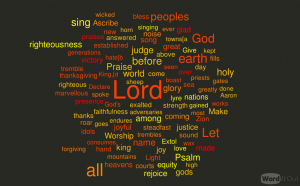If this is your first viewing, please see my Introduction before reading this.
15 August. Job chapters 35-37
Elihu continues his speech uninterrupted. Now he turns his attention to the nature of God, who was considered in those days to dwell above the clouds and to be directly responsible for phenomena such as thunder, lightning, rain and the hot south wind. How could such a remote God be interested in humans? Elihu does claim that God “teaches us more than the animals of the earth, and makes us wiser than the birds of the air” (35:11), but considers that what people do – right or wrong – has no effect on God (“Your wickedness affects others like you, and your righteousness, other human beings”, 35:8).
It is wrong, therefore, (says Elihu) for Job to be so bothered about whether other people, have kept God’s commandments or not (“you are obsessed with the case of the wicked; judgement and justice seize you”, 36:17). However, that does not mean that God is unobservant of human activity. Elihu accepts that God brings judgement on those who do wrong. But we humans have no part in Gods judgement. All that matters is one’s own relationship with God.
Nowadays no-one (presumably) believes in this God-in-the-clouds. Partly because of the progress of science in explaining the way the world works, but also because Jesus established himself as “one of us” and preached that “the Kingdom” [the presence of God] “is within you”. Whatever concept of God we have has to begin with ourselves, our place firmly within the rest of Creation, by no means “wiser” than the birds of the air, and God as somehow within our universe, not outside it. Such an understanding helps us to realise that “no man is an island” – every thought as well as action is connected in some way with everything else, and all we do has consequences.
But to take such logic to extremes is to make God redundant, and play into the hands of humanists and atheists. Human experience is that there is a spiritual realm which science cannot explain; God may be ever-present, but he is yet separate from space and time. God is not so remote that our actions are of no consequence to him, but neither is he changed by our actions – Elihu is right there. Our actions, and attitudes, affect ourselves, other people and our relationship with God. Job is about to find this out for himself.
